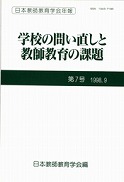Volume 7
Displaying 1-23 of 23 articles from this issue
- |<
- <
- 1
- >
- >|
-
1998Volume 7 Pages 3-4
Published: September 30, 1998
Released on J-STAGE: November 07, 2020
Download PDF (411K)
-
1998Volume 7 Pages 6-13
Published: September 30, 1998
Released on J-STAGE: November 07, 2020
Download PDF (2012K) -
1998Volume 7 Pages 14-24
Published: September 30, 1998
Released on J-STAGE: November 07, 2020
Download PDF (2671K) -
1998Volume 7 Pages 25-32
Published: September 30, 1998
Released on J-STAGE: November 07, 2020
Download PDF (1963K) -
1998Volume 7 Pages 33-40
Published: September 30, 1998
Released on J-STAGE: November 07, 2020
Download PDF (1951K) -
1998Volume 7 Pages 41-50
Published: September 30, 1998
Released on J-STAGE: November 07, 2020
Download PDF (2577K) -
1998Volume 7 Pages 51-59
Published: September 30, 1998
Released on J-STAGE: November 07, 2020
Download PDF (2143K)
-
1998Volume 7 Pages 62-78
Published: September 30, 1998
Released on J-STAGE: November 07, 2020
Download PDF (4536K) -
1998Volume 7 Pages 79-97
Published: September 30, 1998
Released on J-STAGE: November 07, 2020
Download PDF (4804K) -
1998Volume 7 Pages 98-113
Published: September 30, 1998
Released on J-STAGE: November 07, 2020
Download PDF (3926K)
-
1998Volume 7 Pages 116-133
Published: September 30, 1998
Released on J-STAGE: November 07, 2020
Download PDF (4712K) -
1998Volume 7 Pages 134-154
Published: September 30, 1998
Released on J-STAGE: November 07, 2020
Download PDF (5169K) -
1998Volume 7 Pages 155-170
Published: September 30, 1998
Released on J-STAGE: November 07, 2020
Download PDF (4024K)
-
1998Volume 7 Pages 172-176
Published: September 30, 1998
Released on J-STAGE: November 07, 2020
Download PDF (1039K)
-
1998Volume 7 Pages 178-182
Published: September 30, 1998
Released on J-STAGE: November 07, 2020
Download PDF (1228K) -
1998Volume 7 Pages 183-187
Published: September 30, 1998
Released on J-STAGE: November 07, 2020
Download PDF (1251K) -
1998Volume 7 Pages 188-192
Published: September 30, 1998
Released on J-STAGE: November 07, 2020
Download PDF (1310K) -
1998Volume 7 Pages 193-197
Published: September 30, 1998
Released on J-STAGE: November 07, 2020
Download PDF (1090K)
-
1998Volume 7 Pages 200-211
Published: September 30, 1998
Released on J-STAGE: November 07, 2020
Download PDF (2787K)
-
1998Volume 7 Pages 212-214
Published: September 30, 1998
Released on J-STAGE: November 07, 2020
Download PDF (695K)
-
1998Volume 7 Pages 214-216
Published: September 30, 1998
Released on J-STAGE: November 07, 2020
Download PDF (701K)
-
1998Volume 7 Pages 217-219
Published: September 30, 1998
Released on J-STAGE: November 07, 2020
Download PDF (589K)
-
1998Volume 7 Pages 249-257
Published: September 30, 1998
Released on J-STAGE: November 07, 2020
Download PDF (1704K)
- |<
- <
- 1
- >
- >|
